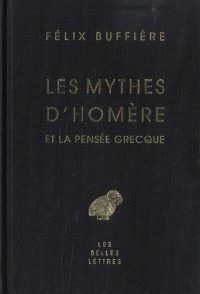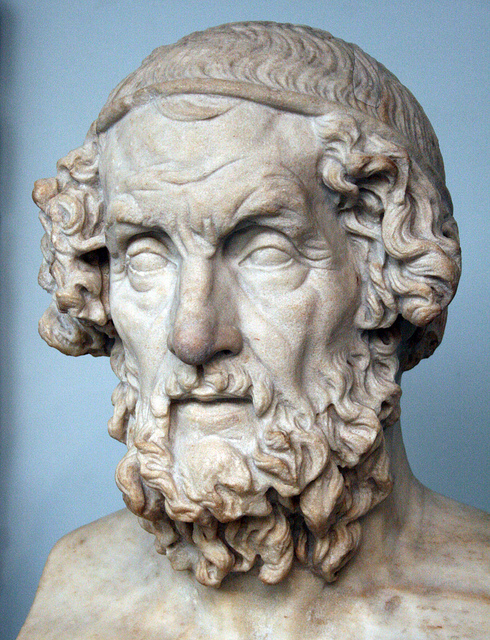Currently reading
Homer's Myths and Greek Thought , by Félix Buffière


As is made crystal clear in Les mythes d'Homère et la pensée grecque , by Félix Buffière (1914-2004), the position the Iliad and the Odyssey held in Greek culture for at least a millenium has no parallel to that of any literary works in any modern culture.(*) For centuries, they were the basic texts used to teach wide-eyed students the wonders of the Greek language, as well as how to understand and act in the world; they were taken to contain insight into how the world works physically, how one should behave or not behave, and even to contain revelations of the mystical, religious, metaphysical nature of reality. Buffière carefully looks at how ancient authors employed each of these approaches to the Homeric texts - the physical, the moral and the allegorical, respectively - from the 6th century BCE through the 5th or 6th century CE. In the process, he provides a necessarily partial, but nonetheless fascinating survey of Greek thought, due to the centrality of physics, ethics and metaphysics and to the prestige of the Homeric poems in Greek culture.
This is not to say that the Homeric poems were accepted in toto by every Greek. Not at all. Most famously, the all too human Homeric gods were not in the least to Plato's taste: he regarded Homer as impious and sacrilegious and banned his work from the ideal Republic. Stoics and Epicureans also found fault aplenty in the apparent religious and moral content of the poems. But their objections had little impact on the influence of the works.
Finally, a solution was found to discharge the tension between the centrality of the texts and the objectionable nature (to some influential thinkers) of their religious and moral content, a solution that is applied again and again in every culture I am familiar with when the most prestigious texts contradict with too great a force some other central tenet of the culture: re-interpret the text allegorically.
There is no need to explain to this audience how the Bible has been so re-interpreted in light of its many apparent contradictions with science and with evolving mores.(**) But you may not be aware of how, similarly, the Shih-ching, the Book of Songs or the Book of Odes, one of the five Confucian classics, was allegorically re-interpreted over the course of time. The Shih-ching is the oldest collection of Chinese poetry and consists of a wide variety of poems; many are essentially folk songs. For reasons I won't go into, the Shih-ching had a huge prestige in Chinese culture, and over time the relatively straightforward poems were re-interpreted and again re-interpreted in increasingly unlikely allegorical forms. For example, in the Sung dynasty the love poems in the Shih-ching were interpreted to refer to the relationship between the literatus/official and his ruler!
A large portion of Buffière's book is taken up with the complex allegorization of the Homeric poems undertaken by the Neoplatonists between the 3rd and 5th century of our era so that, finally, and doubtless to Plato's astonishment, the re-interpreted Homer occupied the place of highest prestige above Plato.(***) Already at the time of Plutarch apologists for Homer were reading the poems as esoteric texts deliberately veiled by the bard so that only the initiated - the purest in spirit - could discern the deepest, divinely inspired revelations hidden within the text. The later Neoplatonists set up a systematic philosophy within which this view of Homer found what they considered a firm foundation. Buffière explains in detail how this bore some rather amazing, exotic kinds of fruit: for example, Porphyry's theory how Homer's brief account of the nymphs' cave on Ithaca described the universe and the motion of human souls between the earth and the stars! In an appendix, Buffière obligingly provides a full translation of Porphyry's curious text.
Buffière's style is inviting, not dry, and he does not assume a great deal of foreknowledge. He clearly summarizes the various philosophical positions that serve as a backdrop to this particular process of adjusting a central text to changes in the culture. Along with gaining a great deal of insight into ancient Greek culture, I think the reader can also benefit from viewing this book as a case study of this process of readjustment of the meaning of central texts (and of the fact that every approach to every matter can and will be carried to the point of absurdity by some subset of humanity). Humankind has done this again and again, and those who would be wise should be well aware of it.
Personally, I find myself closer to Buffière's view that Homer is "the most human and one of the least mystical of poets" than to the mental acrobatics of the Neoplatonists, just as I read the folk songs of the Shih-ching as folk songs. Doubtless a failure of the imagination...
(*) I was made aware of this book by Yann's review
https://www.goodreads.com/review/show/975162391?book_show_action=false&page=1
which I recommend to your attention.
(**) To mention well known examples close to our time; but already the Church Fathers were allegorizing the Bible for their own purposes in the 2nd century CE, and the process is not likely to stop as long as the texts are socially and politically significant.
(***) Interpretation is everything in our little world of the mind: for Plato, Homer's blindness was a result of being bound to the material world; for the Neoplatonic Proclus, Homer's blindness was a mark of turning away from the material to the ideal... Precisely those Homeric anecdotes which disturbed Plato and many others, and which some of the early Christian Church Fathers gleefully employed for propagandistic purposes, are the stories from which the allegorists drew their purest and most abstract lessons.
 5
5












